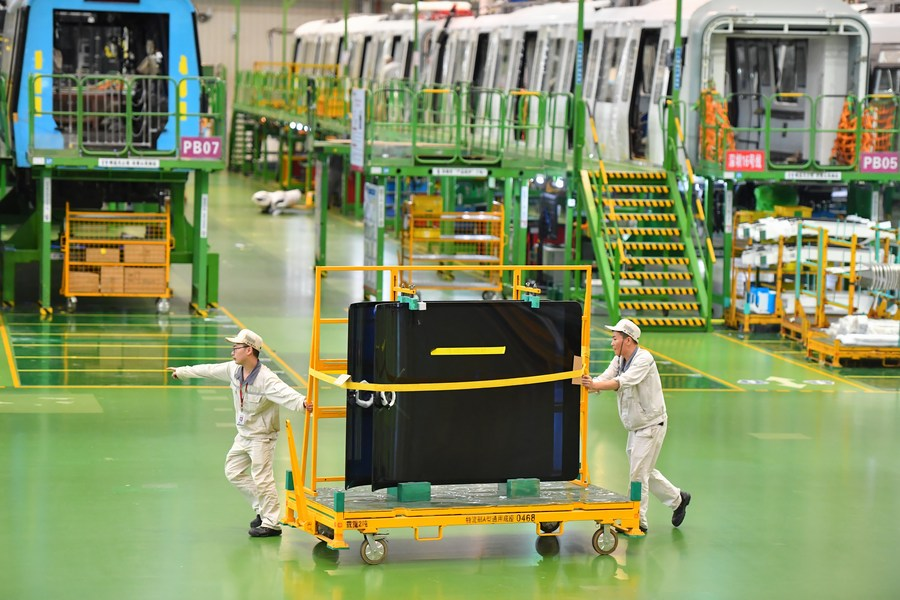What China will do to boost industrial resilience

Workers transport materials at an assembly workshop of CRRC Zhuzhou Locomotive Co., Ltd. in Zhuzhou, central China's Hunan Province, July 5, 2022. (Xinhua/Chen Zeguo)
China's industrial economy showed great resilience in the first half of the year amid complex situations at home and abroad.
The value-added industrial output went up 3.4 percent year on year in H1. In June alone, industrial output growth quickened to 3.9 percent year on year, expanding by 3.2 percentage points from that in May, official data showed.
Looking ahead, there is much to be anticipated in the high-quality development of the nation's industrial economy. The following are some facts, figures and development measures of several key sectors provided by the Ministry of Industry and Information Technology at a press conference on Tuesday.
DIGITAL ECONOMY
China's digital economy has ranked second in the world for several years and has driven the country's overall economic growth.
In H1, the growth of the "contactless" economy, which includes online shopping, online education and telemedicine, picked up speed, while the total revenue of the electronic information manufacturing, software, communications and internet sectors exceeded 10 trillion yuan (1.5 trillion U.S. dollars).
In the next step, the country will strive to make breakthroughs in core technologies and promote the innovative development of digital industries.
Efforts will be made to accelerate the development of new digital infrastructure, promote the integration of the digital economy and the real economy, strengthen digital economy governance, foster a sound industrial development ecosystem, and deepen international cooperation.
CONSUMER GOODS
Consumer goods play an important role in creating jobs, increasing exports and promoting economic development. In H1, the value-added output of the consumer goods industry grew by 4.6 percent year on year, demonstrating strong resilience.
Next, enterprises will be encouraged to add customization, green, intelligence and other new elements into their products, create new sources of growth, and meet consumer demand for personalized and high-quality products.
The country will speed up fostering a batch of smart manufacturing demonstration factories in industries such as garments, home appliances, food and medicine.
Efforts will be made to accelerate building a quality traceability system for key consumer goods to boost consumer confidence.
NEW-ENERGY VEHICLES
China's new-energy vehicle (NEV) industry has grown steadily this year, attracting global attention.
In H1, the country's NEV output and sales reached 2.66 million and 2.6 million units, respectively.
More than 10,000 power battery recycling service stations have been built so far, while 1.3 million charging and swapping facilities were built in the January-June period.
Next, China will further expand the promotion scale of NEVs and encourage automobile consumption.
The country will improve standards, enhance industry supervision, and ensure the supply and stable prices of automobile chips and upstream raw materials. ■